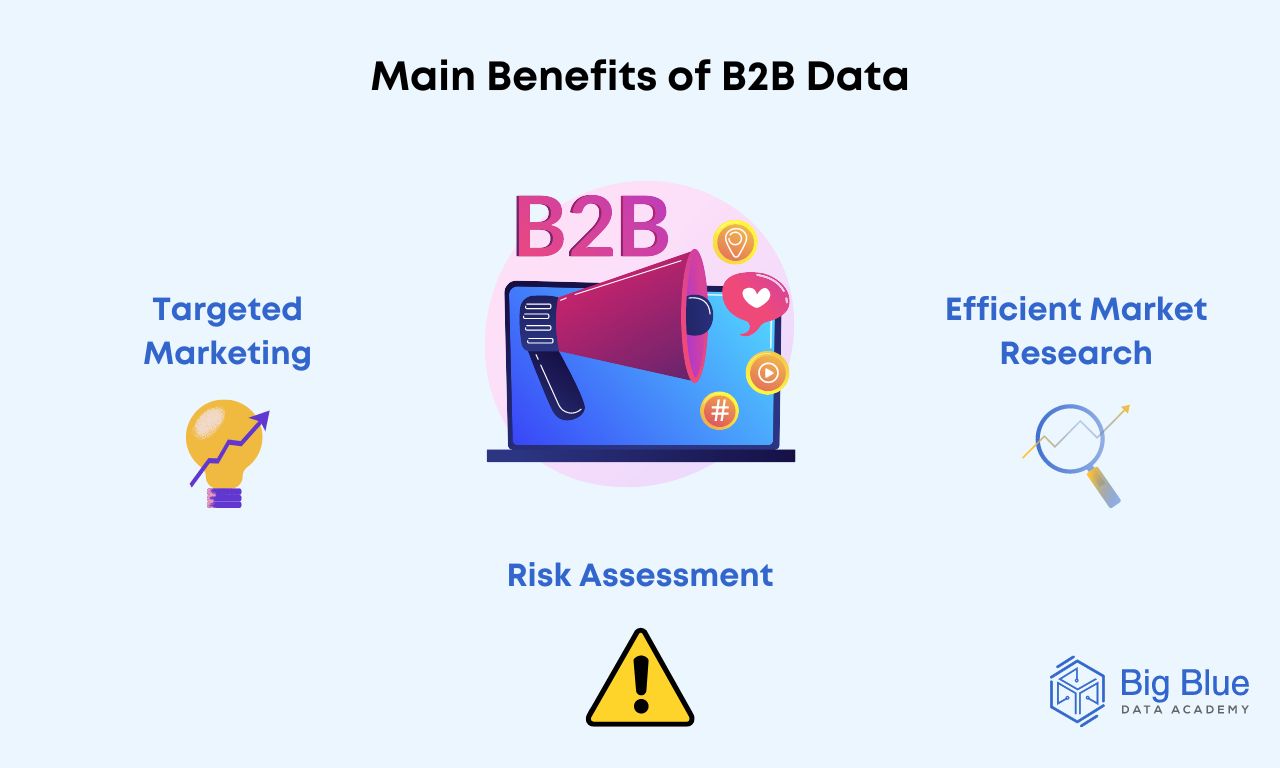B2B Data: Definition, Types & Importance
B2B data forms a fundamental pillar for a multitude of sectors, including sales and marketing, serving as a vital resource for improved and more efficient strategic decision-making, increased business opportunities, and higher profits.
Thus, in this article, we will explore:
What is B2B Data
The Benefits it Offers
Types of B2B Data Available
Let's begin with a basic definition.
What is B2B Data?
B2B data refers to business data exchanged between companies, encompassing information about other companies, their employees, and various aspects of their operations, such as revenues and financing.
Businesses typically utilize this data to enhance their understanding of other companies, facilitate critical decision-making, and respond more effectively to competition.
B2B data is particularly leveraged by marketing and sales teams to create ideal customer profiles, targeted prospect lists, and much more.
This data is collected from various public and private sources and offers valuable benefits, which we'll examine in more detail.
The Main Benefits of B2B Data
Some of the significant benefits offered by B2B data include:

Benefit #1: Targeted Marketing
B2B data enables businesses to identify opportunities by targeting specific sectors, companies, and decision-makers.
This results in better performance, higher return on investment (ROI), and increased conversion rates.
Benefit #2: Efficient Market Research
B2B data provides valuable insights into market trends, customer behavior, and competitive analysis.
This helps businesses, market analysts, and sales teams identify and prioritize potential customers based on specific criteria, such as the specific industry and demographics such as the location.
Benefit #3: Risk Assessment
B2B data can also be used for credit risk evaluation, allowing businesses to assess the financial stability of potential clients or partners before engaging in transactions.
Now, let's look at some primary sources of B2B data.
Key Sources of B2B Data
B2B data can be gathered from various sources, including:
Source #1: Business Directories
Online business directories, such as chamber of commerce listings, contain information about companies, including names, addresses, phone numbers, and industry classifications.
Source #2: Company Websites and Social Media
Companies themselves often provide valuable information on their official websites and social media platforms like LinkedIn, detailing their services, products, key personnel, and contact information.
Source #3: Data Providers
Specialized companies collect, verify, and provide B2B data from different channels, offering comprehensive B2B datasets to businesses.
Source #4: Web Scraping
Web scraping involves extracting information from websites using automated tools, always within legal and data protection frameworks.
Next, let's explore the main types of B2B data.
Main Types of B2B Data
Some important types of B2B data include:
Type #1: Firmographic Data
Firmographic data provides useful information about a company, such as its name, industry, size, location, employee count, and revenues.
Type #2: Contact Data
Contact data offers crucial information about key decision-makers within a company, including:
- Names
- Email addresses
- Location
- Social media profiles
Type #3: Technographic Data
Technographic data includes details about the technology and tools a company uses, such as:
- Web browsers
- Operating systems
- Cloud infrastructure
- CRM platforms
Type #4: Chronographic Data
Chronographic data relates to events and changes that occur within a company over time, such as:
- Location changes
- Funding rounds
- Acquisitions
Type #5: Intent Data
Intent data reveals the online behavior of businesses as they navigate the internet.
This entails information about businesses' interest in products or services, typically gathered from website visits, content downloads, and other digital interactions.
By collecting and analyzing this data, a clearer understanding can be gained about whether a company intends to participate in a market or collaboration.
In Conclusion
In this article, we've covered B2B data, their advantages, and key sources and types of B2B data.
Undoubtedly, data science is a vital and growing field, playing a crucial role in today's business landscape.
If you are enthusiastic and want to learn more about this promising field, follow us for more educational articles.


.jpg)